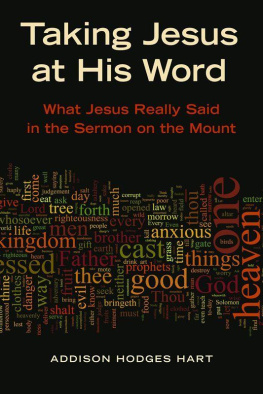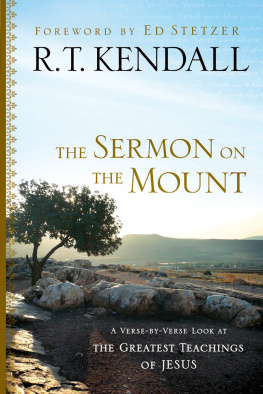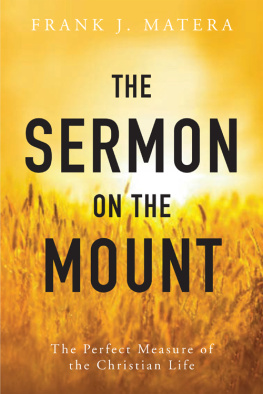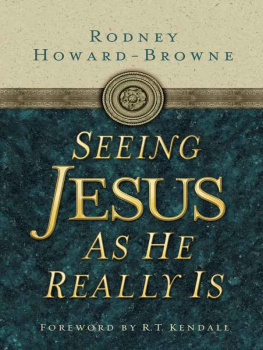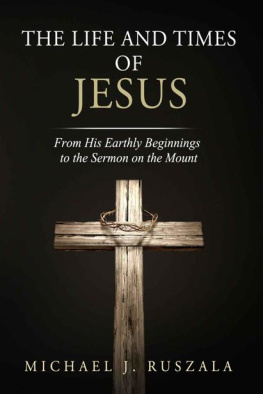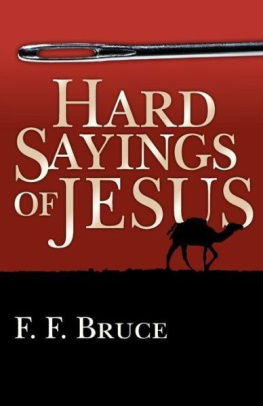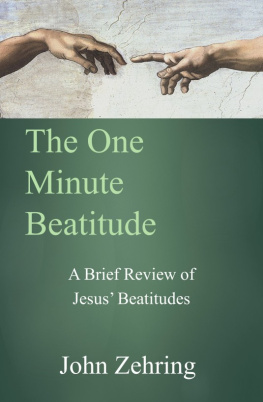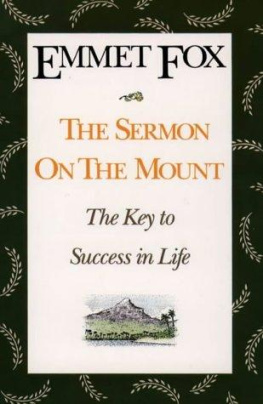We shall not cease from exploration
And the end of all our exploring
Will be to arrive where we started
And know the place for the first time.
Through the unknown, remembered gate.
T. S. Eliot, Little Gidding
Taking Jesus at His Word
WHAT JESUS REALLY SAID IN THE SERMON ON THE MOUNT

Addison Hodges Hart
WILLIAM B. EERDMANS PUBLISHING COMPANY
GRAND RAPIDS, MICHIGAN / CAMBRIDGE, U.K.
2012 Addison Hodges Hart
All rights reserved
Published 2012 by
Wm. B. Eerdmans Publishing Co.
2140 Oak Industrial Drive N.E., Grand Rapids, Michigan 49505 /
P.O. Box 163, Cambridge CB3 9PU U.K.
17 16 15 14 13 12 7 6 5 4 3 2 1
Library of Congress Cataloging-in-Publication Data
Hart, Addison Hodges, 1956-
Taking Jesus at his word: what Jesus really said in the Sermon on the mount /
Addison Hodges Hart.
p. cm.
ISBN 978-0-8028-6691-2 (pbk.: alk. paper)
ISBN 978-1-4674-3595-6 (Mobi)
1. Sermon on the mount Criticism, interpretation, etc. I. Title.
BT380.3.H37 2012
226.9'06 dc23
2012005587
www.eerdmans.com
For
Solrunn
Contents


E very book of this sort owes much to those who have inspired or educated the author. I have spent years meditating on the Sermon on the Mount, and numerous have been the companions who have meditated on it with me. I think of my professors and teachers, some of whom have died (for example, Henri Nouwen, one of my teachers at Harvard Divinity School nearly three decades ago), and some who are still living and teaching new generations of Christian pastors and teachers in the New Testament (especially those who teach at Trinity Episcopal School for Ministry in Ambridge, Pennsylvania). I trust that nothing in this book will discredit them, since any errors or oddities of interpretation are solely my own. I think also of the many students and congregants it has been my privilege over the years to teach, in six churches and four states. Their questions and insights have some place in this and other books Ive written, and Ive probably learned more from them through their shared experiences than they ever did from me through my lectures.
Lastly, I wish to thank the fine folks at William B. Eerdmans Publishing Company, one of the truly fine American religious publishers. It is a genuine privilege to have an association with them. Especially I wish to thank my editor, Mary Hietbrink, who has edited not only this text, but also both my earlier books. I dont believe shes ever made a suggestion I didnt adopt and which, Im sure, only improved the final version. This is my thanks for her work on all three of my books.

T here is a phrase that comes from T. S. Eliots Little Gidding, the concluding portion of his Four Quartets, which could well describe how the Sermon on the Mount strikes many of us. It is the phrase the unknown, remembered gate. The Sermon on the Mount serves, in some ways, as a gate or doorway into the message of Jesus. It is full of passages that are remembered by many who have never stepped inside a church. Blessed are the poor in spirit. Blessed are the meek. A city set on a hill cannot be hid. Our Father who art in heaven. You cannot serve God and mammon. Judge not, that you be not judged. One could go on and on with such remembered, partially remembered, digested or only half-digested lines. The point is, the Sermon on the Mount is an address containing numerous memorable sentences and ideas. And yet, for all its being memorable, it is somehow unknown to us. Unknown, that is, in the sense of it being an address with far more to it than a set of welcome or unwelcome, quite often ignored platitudes. It is, in actuality and intent, a whole way of life that we are meant to ponder, absorb, and by means of which be transformed.
It is to this unknown, remembered gate that I wish to go now, and, if you are willing, I would like to bring you along with me.
If one desires to listen to Jesus, there is no better place to begin than with his words in the Sermon on the Mount. It is, as many have said, the clearest statement of his teachings. It stands in Matthews Gospel as his inaugural address; and because that Gospel was wisely placed as the very first book in the New Testament, the Sermon on the Mount is our first introduction to all the teachings of Jesus.
Taking up three chapters of Matthew, it is the heart of his message of the kingdom of God (or the kingdom of heaven, as Matthew more often renders it). It is called the Sermon [singular] on the Mount, but it may actually be a compilation of many sermons of Jesus, patched together from numerous conferences and skillfully sewn together into one continuous monologue. It may well be that he said the same words many times in different contexts, repeating them often so that they might sink in, not be forgotten, and work on his disciples minds. Luke 6, for example, gives us a sermon on the plain, much of it paralleling Matthews mountain talk. It seems natural enough to assume that a variety of locations served as good places for Jesus to retreat and teach his hearers.
My wish in the pages that follow is to go up to the mountain of Jesus sermon in my imagination, notebook in hand, and put myself before Jesus presence there. I have been there many times before, at all the stages in my life; and now, in midlife, I want to listen anew to him. I wont be hearing him as I did, say, at the age of seventeen or the age of thirty-five. I will hear him now as someone who has lived more than half my life, a life already full with experiences, sorrows, and joys.
In this book I dont wish to theologize too heavily or even attempt more biblical exegesis than is absolutely necessary for my aim. This is a book of reflections; and I want to put any tendency to rationalize and categorize to one side, as best I can, and try to hear Jesus speak. I do not wish to be as concerned with doctrines about Jesus in these pages as about the words of Jesus and their immediate impact on me, a man in his fifties who has lived a while. My aim is to take in his words with as few preconceptions as possible, although one is never entirely devoid of preconceptions. But, I would like just to listen, think, ruminate, and take notes. Then, in turn, offer my notations to you.
No one lives in a vacuum. Everyone has a personal history, and anyone of my age who comes before a great teacher brings along a veritable suitcase filled with failures, sadnesses, regrets, joys, hopes, loves of various sorts, both formal and informal education, political views, religious views, and so on. The point of coming to a great teacher is, in fact, to make sense of all these personal things as well as the world around one, and to learn to see everything and oneself in a new light. Perhaps, in that light, we see that some of our ideas need to fall by the wayside, that others might require adjustment, and that some convictions may even have been strengthened. But, in the final analysis (and every engagement with a great teacher
Next page
